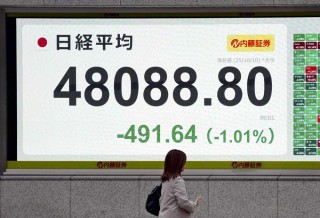Loading
Search
▼ Japan Markets Brace for More Political Uncertainty Following News of Komeito Ending Coalition with LDP
- Category:Other
Tokyo’s financial markets are bracing for more uncertainty in the domestic political landscape following Komeito’s announcement that it had decided to end its 26-year coalition with the Liberal Democratic Party.
Tokyo markets were shaken on Friday, marked by an appreciating yen and sharp decline in Nikkei average futures.
The markets, shifting abruptly from recent highs and overheating, are on edge, suggesting the volatile situation is likely to continue into this week following the three-day weekend.
Uncertainty regarding the political landscape was the main factor suppressing the market on Friday.
Concerns about the future of the LDP-Komeito coalition grew when a meeting between the parties’ leaders was held Friday afternoon, causing the Nikkei-225 Stock Average to temporarily fall by more than 600 points.
When the market closed, it was 491.64 points lower than the previous day at 48,088.80 points. After Komeito announced its withdrawal in the evening, Nikkei futures on the Osaka Exchange fell to the mid-47,000 range.
The Nikkei average had previously surged by more than 2,800 points before the LDP presidential election, driven by anticipation for fiscal expansionary policies from now LDP President Sanae Takaichi.
Dubbed the “Takaichi Trade,” the index reversed course on Friday as selling spread across a broad range of stocks, driven by a reaction to and renewed concerns over the political situation.
Nearly 90% of the stocks listed on the Tokyo Stock Exchange Prime Market fell, resulting in a sweeping sell-off.
“The market did not anticipate Komeito ending the coalition,” said Naoki Fujiwara, a strategist at Shinkin Asset Management Co. “It was a surprise.”
Kohei Onishi of Mitsubishi UFJ Morgan Stanley Securities Co. referred to the possibility of a “black swan,” which refers to an unpredictable event.
“If the opposition parties form a grand coalition and Takaichi does not become prime minister, that would be a ‘black swan’ scenario,” Onishi said. He added that the market might become more volatile this week.
Political concerns also extended to interest rates and the yen exchange rate.
In the Tokyo bond market on Friday afternoon, the yield on the benchmark newly issued 10-year government bond rose to 1.7%, up 0.01 percentage points from the previous day’s closing value, amid falling bond prices. This marked the highest level in about 17 years.
The yen exchange rate in the Tokyo foreign exchange market also accelerated its buying momentum as news of Komeito’s withdrawal from the coalition spread, triggering widespread skepticism about the feasibility of the expansionary fiscal policies advocated by Takaichi.
The yen temporarily appreciated to ¥152.38 per dollar.
However, the market remained volatile and people began selling the yen and repurchasing the dollar as a result of speculation that it will be easier for the Democratic Party and the LDP to work together.
Tokyo markets were shaken on Friday, marked by an appreciating yen and sharp decline in Nikkei average futures.
The markets, shifting abruptly from recent highs and overheating, are on edge, suggesting the volatile situation is likely to continue into this week following the three-day weekend.
Uncertainty regarding the political landscape was the main factor suppressing the market on Friday.
Concerns about the future of the LDP-Komeito coalition grew when a meeting between the parties’ leaders was held Friday afternoon, causing the Nikkei-225 Stock Average to temporarily fall by more than 600 points.
When the market closed, it was 491.64 points lower than the previous day at 48,088.80 points. After Komeito announced its withdrawal in the evening, Nikkei futures on the Osaka Exchange fell to the mid-47,000 range.
The Nikkei average had previously surged by more than 2,800 points before the LDP presidential election, driven by anticipation for fiscal expansionary policies from now LDP President Sanae Takaichi.
Dubbed the “Takaichi Trade,” the index reversed course on Friday as selling spread across a broad range of stocks, driven by a reaction to and renewed concerns over the political situation.
Nearly 90% of the stocks listed on the Tokyo Stock Exchange Prime Market fell, resulting in a sweeping sell-off.
“The market did not anticipate Komeito ending the coalition,” said Naoki Fujiwara, a strategist at Shinkin Asset Management Co. “It was a surprise.”
Kohei Onishi of Mitsubishi UFJ Morgan Stanley Securities Co. referred to the possibility of a “black swan,” which refers to an unpredictable event.
“If the opposition parties form a grand coalition and Takaichi does not become prime minister, that would be a ‘black swan’ scenario,” Onishi said. He added that the market might become more volatile this week.
Political concerns also extended to interest rates and the yen exchange rate.
In the Tokyo bond market on Friday afternoon, the yield on the benchmark newly issued 10-year government bond rose to 1.7%, up 0.01 percentage points from the previous day’s closing value, amid falling bond prices. This marked the highest level in about 17 years.
The yen exchange rate in the Tokyo foreign exchange market also accelerated its buying momentum as news of Komeito’s withdrawal from the coalition spread, triggering widespread skepticism about the feasibility of the expansionary fiscal policies advocated by Takaichi.
The yen temporarily appreciated to ¥152.38 per dollar.
However, the market remained volatile and people began selling the yen and repurchasing the dollar as a result of speculation that it will be easier for the Democratic Party and the LDP to work together.
- October 15, 2025
- Comment (0)
- Trackback(0)


